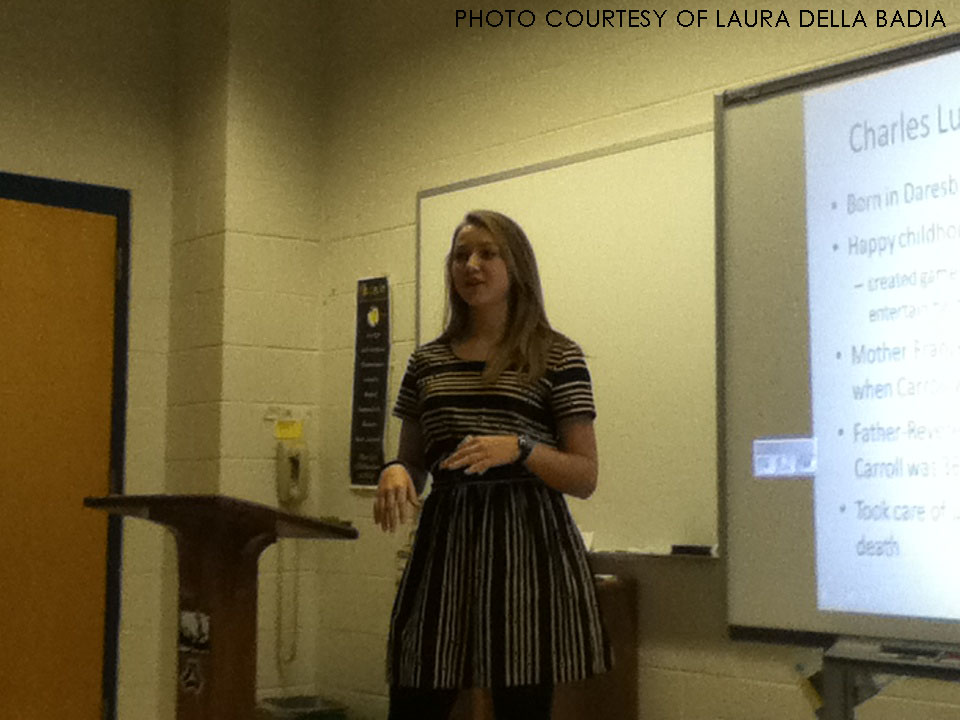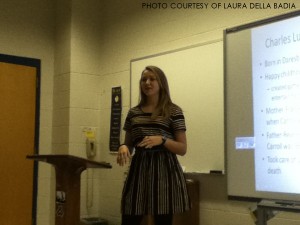

Leesville students have heard of the senior anthology project, but do not know exactly what it is and how it is helps.
Mrs. Stephenson, English teacher, started the anthologies in hopes of bringing together all thirteen years of schooling into one final project. Most of the senior English teachers have picked it up since, tweaking and improving it.
This year’s honors and academic students picked a book, poem, short/creative works related to their specific topic. The AP students researched a poet and critiqued his/her poems because it was a way teachers could better focus on poetry.
“It’s the ultimate 12 grade project,” said Mrs. Wilkerson, English teacher.
The anthology takes a regular research and memorizing project to the next step through using Common Core skills. It combines years of schooling as it has students writing in forms of narrative, expository, persuasive, descriptive and it is critical research. By writing prefaces and critical analysis, students learned how to write professionally for future professions and college.
The seniors then combine the several pieces of writing with a connecting theme. By uniting every idea in their project with one sentence, students better learn how to synthesize different thoughts into one main concept. This helps because in future professions they will be asked to gather information and unite it all together.
Because the students give a grand all presentation, the project also helps students with their speech skills. Being able to talk properly has become essential in this world. One has to talk eloquently for job interviews, presentations and communicating with others.
“And it’s also creative because they can create poetry, artwork, music, short film, etcetera,” said Wilkerson about another purpose for the project. Wilkerson wants students to understand that the knowledge learned through school applies to academia as well as areas of interest.
“It was truly a turning point in my approach to teaching and to this day when I see former students I typically remember their project along with their names,” wrote Stephenson in an email. She was also excited for the projects, because to her, it is a way students showcase their talents and interest.
When this year’s senior anthology project was announced, seniors begrudgingly started. However, many discovered that it was not as bad as previously thought. Granted, the project requires thought and time, but it helps seniors take the information they have learned in school and then apply it to real life.
The first part of the project that really appealed to students was that they could chose their author/poet and works. They could chose the themes and how they design their projects.
“We’re asking you to do all these things, to live with this for 4-6 weeks, but you chose it,” emphasized Wilkerson. By choosing their own, students learned that academics can be interesting and appealing. This can be tied back to Common Core, because one of its purposes is to show students how the skills learned in school applies to outside life as well.
Students did chose their own, only asking teachers for advice. Aside from choosing their own avenue, the project helped students to better their writing and comprehension skills. Also, instead of straight research, students designed their own creative work. They researched information and then connected it to something they are truly interested in, outside of academics.
Alex Umfleet composed his own music while Grace Dorman created her own painting; Kristen Nelson wrote a poem. These and other seniors experienced different creative outputs and gained skills that will help them in academia and outside life.
Nelson did feel that she learned more about poetry and herself, even though it was stressful and time consuming. “It was definitely not as bad as I thought it would be,” said Nelson, after turning in her anthology.
The true challenge of this project was time management. Students will be faced with this difficult problem of time management all through college and their adult life. After staying up all night, Nelson bound her project at Kinko’s at 3:45 in the morning. A competition then arose to see who was at Kinko’s the latest. Claire Cowards arrived at Kinko’s at 4:30 am on November 30.
While students initially called it the “dreaded senior anthology project,” many are proud of their finalized work. Their words are polished and their layout creative. It took Wilkerson years to acquire samples of student anthologies because they were too fond to give their work away.
“In senior English, as students are about to embark on various journeys to diverse destinations, I think we must remain open-minded about the power and spirit of others,” wrote Stephenson. “Ultimately, the assignment and the product allow all of us to feel a sense of accomplishment and deeper appreciation for the nature of curiosity and learning.”